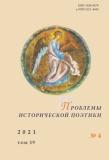Образ вора в восточнославянской несказочной прозе
The Image of a Thief in the East Slavian Non-fairy-tale Prose
Author(s): Tatiana Vladimirovna BauerSubject(s): Customs / Folklore, Lexis, Semantics, Pragmatics, Russian Literature, Eastern Slavic Languages, Cultural Anthropology / Ethnology, Philology
Published by: Петрозаводский государственный университет
Keywords: East Slavic mythology; folk demonology; classification; typology; sorcerer; thief; robber;
Summary/Abstract: This article discusses the status of thievery in the East Slavic tradition. The prime objective of the publication was to determine the place of the thief in the system of characters with supernatural abilities who also belong to the “knower” category. This category usually includes masters, magic experts, and semi-demonic beings. The work is based on the materials of the peasant culture of the mid-19th — early 20th centuries. A systematic description of the image of the thief as a character with supernatural abilities comprised the first stage of research. The research study reveals the reasons for the inclination to theft and typical characteristics and motifs that confirm the demonological status of the thief. The set of supernatural qualities placed this status higher than that of magic experts, but lower than that of semi-demonic beings. Thus, on the conventional scale ‘man — semi-demonic creature’ thieves are above sorcerers and witches. The characters acquired common motifs and characteristics; a lexicological rapprochement between them is revealed in the research. Additionally, the ideas of the thieves’ special social status, which associates them with sorcerers and witches, in the rural community were revealed.
Journal: Проблемы исторической поэтики
- Issue Year: 19/2021
- Issue No: 4
- Page Range: 55-81
- Page Count: 27
- Language: Russian

